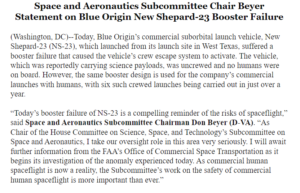FAA To Investigate Blue Origin Launch Failure With Congress Looking On
The FAA said it will investigate the launch failure today of a Blue Origin New Shepard rocket. It was just the second launch failure in the company’s history and the first since 2015. The reusable rockets and capsules can carry either cargo or passengers. Although today’s flight carried only experiments, not people, the chairman of the House subcommittee that oversees commercial spaceflight said it’s a reminder of the risks involved and he will be keeping an eye on it as well.
Blue Origin, founded and owned by Jeff Bezos, has launched the suborbital New Shepard rocket 23 times from its launch site in West Texas, near Van Horn. All the launches except the first in 2015 have been successful until today.
Since July 20, 2021, the company has focused on passenger flights, with seven successes in a row, taking 31 people to space. Bezos himself and his brother, Mark, were on the first crewed flight and several luminaries, incuding Star Trek actor William Shatner, have flown since then.
Today’s flight, New Shepard-23 (NS-23), however, did not carry any people.
Instead, NS-23 carried 36 payloads, 34 inside the capsule two on the outside. Eighteen of the payloads were funded by NASA, primarily through the Flight Opportunities program, and 24 were from K-12 schools, universities, and other organizations focused on STEM education.
The approximately 10-minute flight boosts a capsule to an altitude just over 100 kilometers (62 miles), which some consider the demarcation between air and space. Then the capsule separates from the booster and the two land separately back on terra firma, ready to fly again. This was the ninth flight of this rocket.

The launch was webcast live on Blue Origin’s website and the company tweeted video of the rocket’s malfunction showing that the capsule automatically separated from the rocket and landed safely as it was designed to do. The capsule intentionally fires thrusters to soften the landing just as it touches down, spewing up a cloud of dust.
Booster failure on today’s uncrewed flight. Escape system performed as designed. pic.twitter.com/xFDsUMONTh
— Blue Origin (@blueorigin) September 12, 2022
During today’s flight, the capsule escape system successfully separated the capsule from the booster. The booster impacted the ground. There are no reported injuries; all personnel have been accounted for.
— Blue Origin (@blueorigin) September 12, 2022
The cause of the accident is under investigation by the company as well as the FAA.
The FAA’s Office of Commercial Space Transportation (FAA/AST) regulates, facilitates and promotes the commercial space launch and reentry business and is responsible for public safety. All commercial space launches require an FAA license. It issued a statement that it will oversee the investigation.

This evening, Rep. Don Beyer (D-VA), chairman of the Space and Aeronautics Subcommittee of the House Science, Space, and Technology Committee, said he will be watching the investigation, too. Although this flight was not carrying passengers, the failure “is a compelling reminder of the risks of spaceflight.”

UPDATE, September 15: Beyer and subcommittee Ranking Member Brian Babin (R-TX) sent a joint letter to acting FAA Administrator Billy Nolan today asking that they kept informed.
In the House, the SS&T Committee historically has jurisidiction over commercial space launches. The 1984 Commercial Space Launch Act that assigned responsibility to the Department of Transportation, of which FAA is part, and most of the amendments to it since then originated there.
The rest of the FAA is overseen by the Transportation and Infrastructure Committee. In recent years, it has occasionally held hearings on commercial space transportation, but as of press time had not issued a statement about today’s accident. Nor has the Senate Commerce, Science, and Transportation Committee, which has jurisdiction in the Senate.
New Shepard is named after Alan Shepard, who became the first American to reach space on a suborbital mission on May 5, 1961. Blue Origin is also building the orbital New Glenn rocket, named after John Glenn, the first American to orbit the Earth on February 20, 1962.
This article has been updated.
User Comments
SpacePolicyOnline.com has the right (but not the obligation) to monitor the comments and to remove any materials it deems inappropriate. We do not post comments that include links to other websites since we have no control over that content nor can we verify the security of such links.